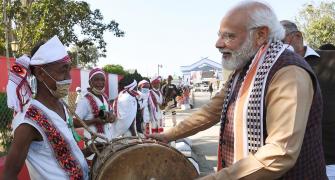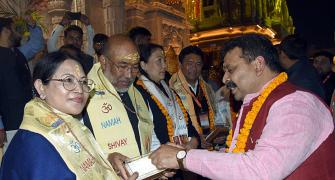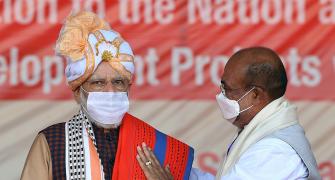The fulcrum of victory or defeat of parties attempting to form a government is held by smaller players and those willing to defect.

In Manipur, voters are a tired lot. They've lost track of candidates and their parties -- that's to say, which candidate belongs to which party.
Party-hopping has caused erosion of faith, lack of development, and loss of trust.
As the state went to the polls on February 28 and March 5, many are now asking themselves if the candidate they vote for will stay in the party he represents after the government is formed.
Possibly this is the reason margins of victory are so narrow.
Defection is rampant because the people are voting for individuals, not parties. But that is an academic point.
The fulcrum of victory or defeat of parties attempting to form a government is held by smaller players and those willing to defect.
In the 2012 assembly election, of the total number of seats in the Manipur assembly (which is 60), 20 saw a victory margin of less than a thousand votes. One seat was won by 19 votes.
On that occasion, it was the Trinamool Congress that led in upsetting the apple cart. The party made its debut in the 2012 polls, winning seven seats.
Today, it has no MLAs left in the assembly. They have all decamped to other parties.
In the 2017 assembly elections, the Bharatiya Janata Party bagged 21 seats of the 60 and led the coalition government formed with the support of the Naga People's Front, National People's Party, Lok Janshakti Party, and an Independent candidate.
Despite the Congress being the single largest party securing 28 seats, it fell short of forming a government.
In the past five years, the Congress's best-known leader, N Biren Singh, crossed over to the BJP; state party chief Govindas Konthoujam, a former minister and six-time Congress MLA from Bishnupur, crossed the floor in August last year and joined the BJP; the BJP gave a ticket to Rajkumar Imo Singh, a Congress defector and N Biren Singh's son-in-law.
Imo Singh had earlier been elected on the Congress ticket from the Sagolband constituency in the 2017 polls, defeating BJP candidate Kh Loken by 19 votes. In retaliation, Loken, a BJP old-timer, joined the Janata Dal-United, a party that has contested the election in Manipur time and again but with no success.
This time, both the Congress and the BJP are guarding their bastions zealously. But both are facing problems.
Relations between the BJP and the NPP have not been cordial. Of the four NPP ministers in the government, two were dropped in 2021.
The leader of the party, Conrad Sangma, ambitious and young, is seen as an important, upcoming leader in the north east.
His party is an influential member of the North East Democratic Alliance, a non-Congress political platform floated by the BJP after it won the Assam elections in 2016.
His party is contesting 40 seats of the 60. He has already demonstrated his remarkable skills in his home state, Meghalaya, where both the Congress and the BJP are supporting the same government -- his.
This makes him an important kingmaker if the BJP and the Congress are tied.
The Janata Dal-United has never won -- but it is still an important alliance partner of the National Democratic Alliance and is running a government in Bihar with the BJP's support.
However, in this election, it has kept its door open and has welcomed many from the BJP who were denied a ticket as the BJP welcomed defectors from the Congress. And so it goes.
The election should be a referendum on the performance of the state government.
In Manipur, the divide between the valley (occupied largely by the Hindu Meiteis) and the hill areas dominated by the Naga and Kuki tribes is huge.
In the House, 40 seats cater to the Meitei-dominated Imphal Valley, while only 20 seats are reserved for the Hills though the Kukis and Nagas together constitute 45 per cent of the population in Manipur.
Recently, on the occasion of laying the foundation stone of the Rani Gaidinliu museum, Union Home Minister Amit Shah said: 'Before coming to power in Manipur, we had promised to end bandh, hartal, and blockade. We have ended all the three and significantly improved the law and order situation in Manipur.'
But this does not square with the reality on the ground: In November last year, Colonel Viplav Tripathi of Assam Rifles, his wife, and his six-year-old son, apart from four others of the paramilitary outfit, were killed in an ambush in Churachandpur.
The National Intelligence Agency is still looking for the killers.
Problems of livelihood dog Manipur.
Congress leader Jairam Ramesh had recently focused on the problem of urea blackmarketing in the state, accusing the BJP-led government of diverting its quota of urea to the state’s hill districts, where poppy is allegedly grown for opium.
Although Manipur was getting twice the urea it needed, Ramesh said farmers complained of shortages. A recent decision to enable palm oil plantation in the state, Ramesh believes, 'will only transfer profits and farm lands to two or three big palm oil companies'.
He also wants to see action on the government's promise of minimum support price to produce grown by farmers in Manipur.
'If there really is a double-engine government, what has the Manipuri gained from this?' he asks.
Most analysts believe smaller parties will hold the key to government formation. March 10 will bring the answer.











